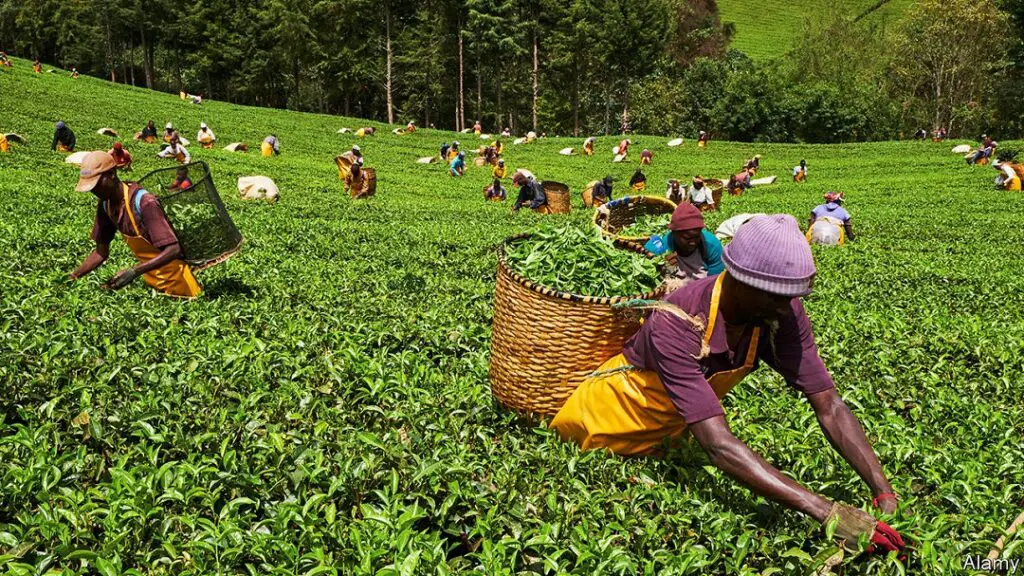- Kapchorua Tea Kenya saw an 87 per cent increase in net profit for the half-year period, reaching $1.4 million compared to $762,240 in the same period last year.
- Similarly, Williamson Tea Kenya posted a 93 percent increase in net profit during the same period, reaching $3.1 million compared to $1.6 million in the previous year.
- Management attributes this growth to cost containment, the use of modern technology, and a weakening shilling.
Kenya’s tea sector is experiencing a recovery, with two tea exporting companies reporting significant increases in net profit for the six months ending September 30, 2023 following strong earnings due to weakening currency.
Both Kapchorua Tea and Williamson Tea, which are listed on the Nairobi Securities Exchange, recorded profit increases of over 80 per cent in the period, attributed to a rise in demand.
Kenya’s tea sector players post huge profit gains
Kapchorua Tea Kenya saw an 87 per cent increase in net profit for the half-year period, reaching $1.4 million compared to $762,240 in the same period last year. Similarly, Williamson Tea Kenya posted a 93 per cent increase in net profit during the same period, reaching $3.1 million compared to $1.6 million in the previous year.
Management attributes this growth to cost containment, the use of modern technology, and a weakening shilling. Both companies emphasized continuous investment in their farms, robust cost management initiatives, and the hard work of their management teams as contributing factors.
Kapchorua Tea’s turnover increased by 20 per cent to $6.1 million, with total assets rising by 16.2 per cent to $17 million, attributed to an increase in the fair value of biological assets. In light of the improved performance, Kapchorua Tea announced the payment of an interim dividend of $0.0656 (Kes10.00) per share to shareholders.
Another tea exporter Williamson Tea Kenya reported a turnover of $14.7 million and total assets of $56 million during the period under review. The company remains focused on producing sustainable high-quality liquoring teas for global growth markets.
Tea exports in the second quarter of 2023 increased by 13 per cent year on year, supported by heightened demand from Kenya’s traditional markets, as per data from the Central Bank of Kenya. The outlook for tea production this year is positive, with improved rains and a weaker shilling against major currencies.
The weakening shilling against the dollar, euro, and British pound is expected to benefit tea exporters when converting their external earnings to shillings.
So far, the shilling has depreciated by 14 per cent against the US Dollar, 18 per cent against the pound, and 16.7 per cent against the Euro. Kenya, a major producer of tea, is one of the leading exporters of tea globally, contributing significantly to foreign exchange earnings.
Read also: Kenya’s investment landscape amid high taxes, weakening Shilling
Kenya’s tea industry synonymous with country’s economic health
Kenya’s tea industry stands as a cornerstone of the nation’s agricultural heritage, intertwining economic prosperity with lush landscapes that stretch across the highlands. Renowned for producing some of the world’s finest teas, Kenya’s tea sector has become synonymous with quality, sustainability, and a crucial contributor to the country’s economic fabric.
Historically, tea cultivation in Kenya dates back to the early 20th century, with British settlers introducing tea plants to the fertile soils of the Kericho and Nandi regions. Over the years, the industry has blossomed into a vital economic force, generating employment, fostering rural development, and serving as a linchpin in Kenya’s foreign exchange earnings.
Key to the industry’s success is the unique combination of Kenya’s geographical features and climate. The high-altitude regions, such as the Kericho Highlands, provide an ideal environment for tea cultivation, contributing to the distinctive flavor profiles that set Kenyan tea apart in the global market.
In recent years, Kenya’s tea industry has demonstrated resilience and adaptability in the face of evolving market dynamics. Noteworthy is the sector’s commitment to sustainable practices, including environmentally friendly farming methods and social responsibility initiatives. Many tea estates in Kenya prioritize fair labor practices and community development, aligning the industry with global sustainability trends.
Art of tea cultivation
The strength of Kenya’s tea industry is underscored by the performance of key players such as Kapchorua Tea Kenya and Williamson Tea Kenya. The notable increases in net profits reported by these companies reflect a robust demand for Kenyan tea, driven by a combination of factors, including cost containment, technological innovation, and a favorable exchange rate.
Kenya’s tea sector is not only a source of economic vitality but also a cultural touchstone. The art of tea cultivation and processing has been passed down through generations, creating a heritage deeply rooted in Kenyan identity. Moreover, the industry’s impact extends beyond national borders, with Kenya standing as one of the leading exporters of tea globally.
As Kenya’s tea industry continues to evolve, embracing innovation and sustainability, it remains a beacon of success, brewing prosperity for the nation while leaving an indelible mark on the world’s tea aficionados.











